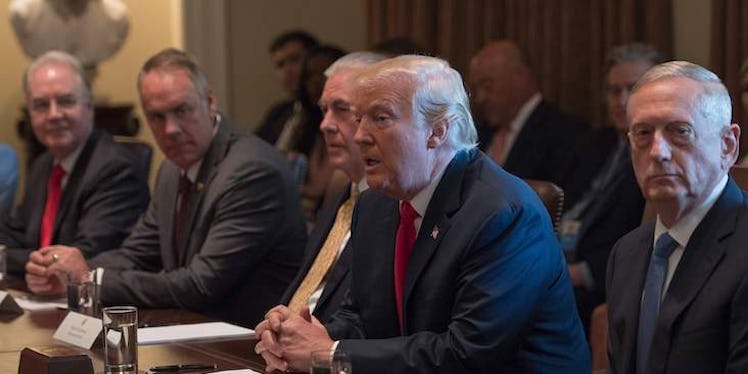
Surprise! Donald Trump’s Government Is The Most Male-Dominated In Decades
Despite President Donald Trump's occasional assurances that he has a "tremendous respect" for women, the proof is in the pudding. In news that will surprise no one, an analysis of the Trump administration shows it is overwhelmingly male, The Guardian reported on Sept. 21. And the few women in the Trump administration are members of the most male-dominated federal government in nearly 25 years — according to political action committee American Bridge 21st Century, 80 percent of Trump's 408 political nominees are men.
That's 327 men and 80 women -- 129 of whom, so far, have been confirmed by the Senate. In his Cabinet, only three out of 15 members are women: Secretary of Education Betsy DeVos, Secretary of Transportation Elaine Chao, and acting Secretary of Homeland Security Elaine Duke. And only one — one — of Trump's 42 nominees for state attorneys general is a woman.
If all of Trump's nominations are approved, men will outnumber women four-to-one in top roles. It's so bad, Trump's Cabinet actually has a smaller proportion of nonwhites and women than any cabinet since Ronald Reagan, who left office in 1989. (Former President Barack Obama's cabinet, for comparison, was roughly one-third women, less than Bill Clinton, but more than George W. Bush, according to FiveThirtyEight.)
The Trump administration's lack of diversity is, unfortunately, reflective of a larger trend in politics.
According to the Center for American Women and Politics (CAWP) at Rutgers University, women made up just 19.4 percent of members of Congress in 2017.
At a state level, women don't fare much better. As of 2017, just 24.9 percent of state legislators in the U.S. are women. Similarly, though the 115th Congress is the most racially and ethnically diverse in U.S. history, less than 20 percent of both the House and the Senate are people of color, according to Pew Research Center.
This is all despite the fact that, according to the U.S. Census Bureau, as of July 2016, women make up 50.8 percent of the U.S. population -- more than half. And people of color make up a large portion of the population: the U.S. is 61.3 percent non-Hispanic/Latinx white. That means that people of color and white Hispanic/Latinx Americans account for just shy of 40 percent of the U.S.
The government doesn't look like America. Trump's White House doesn't look like America.
The lack of diversity at the top of the federal government is especially disconcerting. These political appointees, though only a fraction of the government, are all top-level officials -- the ones, according to The Guardian, "who drive policymaking at scores of federal agencies." And when you have people making decisions that will affect the entire country -- and even the world, in some instances -- you need fair representation in order to guarantee policies that don't negatively affect ordinary people.
Trump's administration speaks to a larger social ill: the lack of political representation of women, people of color, people with disabilities, LGBTQ folks -- all Americans, all fighting desperately to be heard -- leads to a lack of equitable policy.
When you have a government that is made up of 80 percent men, that is about 80 percent white, you have a government that, whether purposefully or by accident, omits women and people of color from their policy decisions. It's why the many attempts to repeal the Affordable Care Act (ACA) have included plans that would disproportionately, negatively affect women and people of color -- because things like pre-natal care and access to birth control are seen as nonessential by the white men who are making the decisions and crafting these bills.
This discrepancy is why there are so many policies that are downright harmful to women -- why we have politicians like Republican Rep. Steve King (Iowa) thinking that we can just cut the budget for Planned Parenthood -- which provides services to a largely female, largely low income population -- in order to pay for a border wall between the U.S. and Mexico.
It's why the Texas state legislature -- which is made up of 20.4 percent women, according to CAWP -- passed an abortion law so heinous and so restrictive, it's been dubbed "rape insurance."
It's why laws that allow discrimination against the LGBTQ community under the guise of religious freedom pass. It's why the North Carolina bathroom bill passed.
It's why Trump decided to restrict $9 billion in foreign health assistance -- including money for HIV/AIDS prevention and children's health initiatives -- by signing a global gag rule extension, which states that groups that "promote abortion" (which means any health care group that provides or merely counsels about abortion services) are forbidden from receiving U.S. dollars.
It's because large swaths of the American population don't have a say in policymaking on state and federal levels.
In sum? Gender and ethnic/racial parity are essential. When people are left out of these policymaking conversations, their points of view aren't considered, and they get hurt. We get hurt.